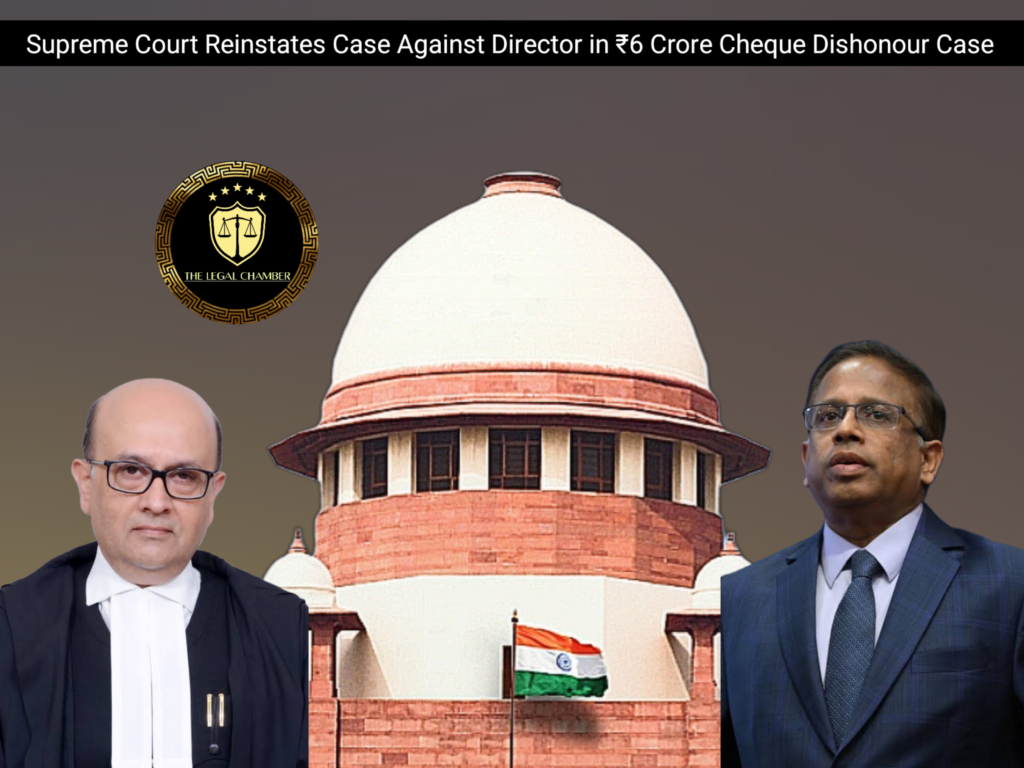
The Supreme Court clarified that for vicarious liability under Section 141 of the Negotiable Instruments Act, complaints need not reproduce statutory language verbatim. Substantive allegations demonstrating a director’s responsibility for company affairs suffice. The Court emphasized substance over form, ruling that technical pleading deficiencies don’t invalidate proceedings if the complaint, read holistically, establishes the director’s operational role. The judgment reinstated criminal proceedings against the director, overturning the High Court’s quashing order.
Facts Of The Case:
The case involved a complaint filed by HDFC Bank against M/s R Square Shri Sai Baba Abhikaran Pvt. Ltd. and its directors, including Mrs. Ranjana Sharma (Respondent No. 2), for dishonor of a cheque worth ₹6.02 crore under Section 138 of the Negotiable Instruments Act. The company had availed credit facilities from the bank between 2014-2016, which later turned into a non-performing asset. When the issued cheque bounced due to “account blocked,” the bank initiated legal proceedings against all directors. The Metropolitan Magistrate issued process, but the Bombay High Court quashed proceedings against Mrs. Sharma, holding the complaint lacked sufficient averments to establish her vicarious liability under Section 141 of the NI Act. The High Court found the complaint did not specifically allege she was “in charge of and responsible for” the company’s business. HDFC Bank appealed to the Supreme Court, arguing the complaint’s collective averments – including her authorization to negotiate loans, mortgage properties, and execute documents – sufficiently indicated her active role in company affairs. The core dispute centered on whether the complaint met the statutory requirements to proceed against a director when it alleged she was “responsible for day-to-day affairs” rather than using the exact phrasing of Section 141.
Procedural History:
The procedural history began when HDFC Bank filed a complaint under Section 138 of the Negotiable Instruments Act before the Metropolitan Magistrate, 7th Court, Bhiwandi, Mumbai, after a ₹6.02 crore cheque issued by M/s R Square Shri Sai Baba Abhikaran Pvt. Ltd. was dishonored. On December 16, 2019, the Magistrate issued process against the company and its directors, including Mrs. Ranjana Sharma. The directors then approached the Bombay High Court via Criminal Writ Petition No. 275 of 2022 seeking quashing of proceedings. By its judgment dated January 10, 2024, the High Court quashed proceedings against Mrs. Sharma, holding the complaint lacked necessary averments to establish vicarious liability under Section 141 of the NI Act. Aggrieved by this decision, HDFC Bank filed a Special Leave Petition (Crl.) No. 6964 of 2024 before the Supreme Court, which granted leave and heard the matter as Criminal Appeal No. _____ of 2025. The Supreme Court, in its judgment dated May 22, 2025, overturned the High Court’s decision and restored the proceedings before the Magistrate, holding that the complaint’s averments sufficiently complied with Section 141 requirements when read holistically. The case was remanded to continue trial in accordance with law.
READ ALSO : CBI vs. Accused: Supreme Court Rules on Discharge in Cotton MSP Scam Case
Court Observation:
The Supreme Court made several critical observations while overturning the Bombay High Court’s decision. It emphasized that Section 141 of the Negotiable Instruments Act doesn’t require mechanical reproduction of statutory language in complaints, but rather substantive compliance through factual averments demonstrating a director’s responsibility for company affairs. The Court noted the complaint specifically alleged Respondent No. 2 was “responsible for day-to-day affairs, management and working of the Company,” which substantially met Section 141 requirements when read with other averments about her active role in loan negotiations and document execution. Importantly, the Bench observed that administrative details of a director’s specific role need not be pleaded as they fall within the accused’s special knowledge. The judgment clarified that vicarious liability under Section 141 is attracted when complaints holistically establish a director’s operational control, rejecting hyper-technical approaches that demand verbatim statutory wording. The Court distinguished this case from precedents where complaints contained only omnibus allegations, noting here the specific authorizations given to Respondent No. 2 in board resolutions (to mortgage properties, execute documents etc.) corroborated her active involvement in the company’s financial decisions. These observations reaffirmed the principle that substance of allegations prevails over formalistic compliance in NI Act cases.
Final Decision & Judgement:
The Supreme Court allowed HDFC Bank’s appeal and set aside the Bombay High Court’s quashing order in its judgment dated May 22, 2025. The Bench comprising Justices Manoj Misra and K.V. Viswanathan held that the complaint’s averments, when read holistically, sufficiently established Respondent No. 2’s vicarious liability under Section 141 of the Negotiable Instruments Act. The Court restored the Magistrate’s December 16, 2019 order issuing process against Mrs. Ranjana Sharma and directed the trial court to proceed with the case in accordance with law. The judgment clarified that complaints need not reproduce statutory language verbatim, provided they demonstrate the director’s substantive responsibility for company affairs through factual allegations. This decision reinforces the principle that technical pleading deficiencies shouldn’t defeat NI Act cases when the complaint’s substance satisfies statutory requirements. The Court emphasized that directors actively involved in financial decisions cannot avoid prosecution through hypertechnical interpretations of pleading formalities
Case Details:
Case Title: HDFC Bank Limited vs. State of Maharashtra & Anr. Citation: 2025 INSC 759 Criminal Appeal No.: (Arising out of SLP (Crl.) No. 6964 of 2024) Date of Judgment: May 22, 2025 Judges/Justice Name: Justice Manoj Misra & Justice K.V. Viswanathan
Download The Judgement Here